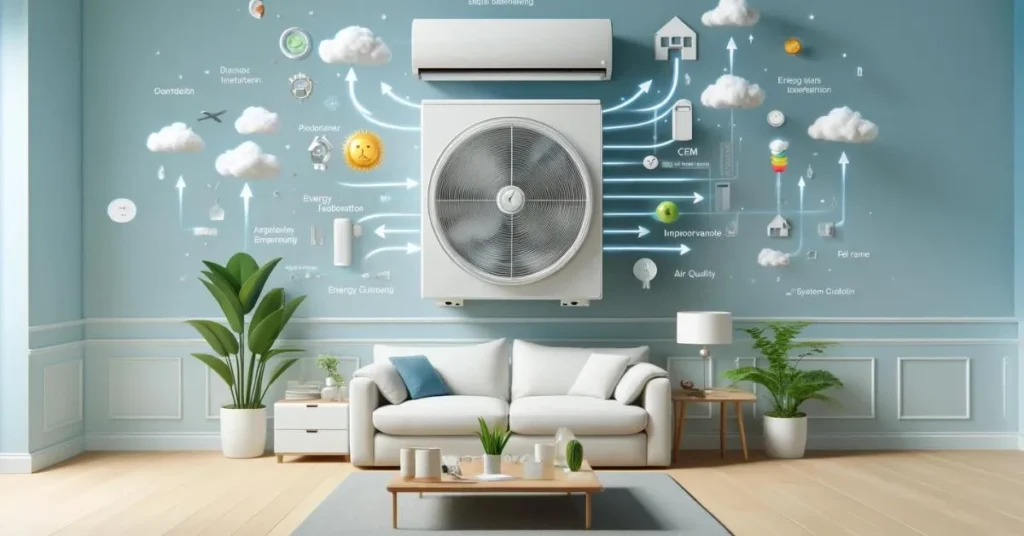In the complex world of HVAC systems, understanding the principles of airflow is critical to maximizing efficiency and ensuring a comfortable indoor environment. One key metric in this realm is Cubic Feet per Minute (CFM), which measures the volume of air moved by the system.
The role of CFM in influencing the efficiency of an HVAC system cannot be overstated. This introduction will explore the nuanced relationship between CFM and HVAC efficiency.
For optimal HVAC performance, River Valley Air Conditioning explains: “What is CFM in HVAC?”, highlighting how the right CFM can make or break the efficiency of your system.
Energy consumption
A higher CFM rating in an HVAC system ensures that a greater volume of air is circulated through the space per unit of time. This capability directly influences energy consumption.
When the CFM is optimally matched to the space and the system’s requirements, it allows the HVAC unit to work efficiently, translating to lower energy usage and reduced utility bills. Conversely, if the CFM is too high for the needs of the space, the system may cycle on and off too frequently, leading to excessive energy consumption.
On the other hand, a CFM rating that is too low will force the system to run longer to achieve the desired temperature, again increasing energy use. Therefore, selecting the right CFM is crucial for balancing efficiency and energy consumption in HVAC systems.
Comfort levels
The impact of CFM on comfort levels in a space is significant. An HVAC system with an appropriate CFM rating delivers air efficiently and evenly across all sections of an environment, maintaining a consistent temperature and eliminating hot or cold spots.
This optimized airflow ensures that occupants feel comfortable regardless of their location in the room. In contrast, a mismatched CFM can lead to uneven temperature distribution, making some areas too cold or too warm, thus affecting the overall comfort level negatively.
Hence, CFM not only influences the system’s efficiency but also directly affects the comfort and satisfaction of the occupants, underlining the importance of precise CFM calculation for achieving a harmonious indoor climate.
Air quality
Improving air quality is another critical advantage of correctly adjusting the CFM in an HVAC system. A system calibrated with the proper CFM ensures that air is circulated and filtered with optimal efficiency. This regular and efficient circulation helps to remove contaminants like dust, pollen, and other allergens from the air, significantly enhancing indoor air quality.
Also, maintaining the right CFM can help control humidity levels inside a space. Extreme humidity can encourage the growth of mold and mildew, whereas air that is too dry can lead to discomfort and respiratory issues.
Thus, by effectively managing CFM, an HVAC system not only contributes to a more energy-efficient operation but also advocates a healthier indoor environment by improving the air quality.
System longevity
Correctly adjusting the CFM in an HVAC system plays a significant role in extending the system’s longevity. When the CFM is balanced with the system’s capacity and the size of the space, it ensures that the HVAC unit operates under optimal conditions, reducing wear and tear on its components.
Running an HVAC system at an inappropriate CFM level strains the system—either by causing it to cycle on and off too frequently or forcing it to run longer than necessary. Over time, this undue stress leads to accelerated deterioration, necessitating more frequent repairs and ultimately shortening the system’s lifespan.
Therefore, by carefully calibrating the CFM to the space’s specific needs, HVAC systems can maintain their efficiency over a longer period, reducing the need for premature replacements and saving homeowners significant costs in the long run.
Noise levels
The CFM rating of an HVAC system also significantly impacts noise levels, an often overlooked aspect of HVAC efficiency. When the CFM is too high for a system’s capacity or the size of the space, it can cause the system to operate at an increased noise level. This is because the system has to work harder and faster to move air through the ducts, which can lead to increased vibration and noise.
Conversely, a low CFM can result in a super quiet operation, but it may also indicate that the system is not effectively circulating air throughout the space, potentially compromising efficiency.
Therefore, achieving the right balance of CFM is essential not only for maintaining energy efficiency and comfort but also for ensuring that the system operates quietly, adding to the overall comfort and satisfaction of the occupants.
FAQs
1. What exactly is CFM, and why is it important for my HVAC system?
CFM stands for Cubic Feet per Minute and measures the volume of air that your HVAC system circulates through a space every minute. It’s crucial because it directly affects your system’s energy efficiency, comfort levels, air quality, system longevity, and noise levels. Properly matching the CFM to your space and system requirements ensures optimal performance.
2. How does the wrong CFM affect my energy bills?
If the CFM is too high for your space, your HVAC system might cycle on and off more frequently, leading to higher energy consumption and increased bills. Conversely, a CFM that’s too low can cause your system to run longer to achieve the desired temperature, also increasing your energy usage and costs. Finding the right CFM is essential for energy efficiency and lower utility bills.
3. Can the CFM of my HVAC system impact my health?
Yes, the CFM plays a significant role in maintaining indoor air quality. An HVAC system with the correct CFM ensures efficient circulation and filtration of air, removing pollutants like dust, pollen, and allergens, which improves air quality. Additionally, it helps control humidity levels, reducing the risk of mold, mildew growth, and preventing air that’s too dry, which can be uncomfortable or harmful to respiratory health.
4. Why does CFM matter for system longevity?
An appropriately adjusted CFM ensures that your HVAC system operates under optimal conditions, minimizing wear and tear on its components. Operating a system at an incorrect CFM level can lead to frequent cycling or extended run times, causing undue stress on the system. This accelerated deterioration can lead to more frequent repairs or a shortened lifespan, thereby affecting system longevity.
5. How does CFM influence noise levels of the HVAC system?
The CFM rating can significantly impact the operational noise level of your HVAC system. A CFM that’s too high can cause the system to work harder and faster to move air, resulting in increased noise from vibrations and airflow through ducts. Conversely, while a low CFM might lead to quieter operation, it may indicate insufficient air circulation, affecting efficiency. Balancing CFM is key to ensuring quiet operation without compromising on performance.











